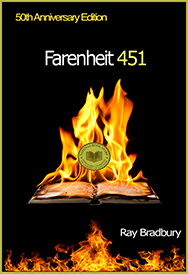| Table Of Contents | ||
IS FIRE USED FOR GOOD OR EVIL? BY MARISSA HALL |
||
 |
||
Book Cover Image by Noel McKeever |
||
The firefighter, Montag, was grinning as he thought “It was a pleasure to burn” (1). In the novel Fahrenheit 451, by American author Ray Bradbury, we can infer that Ray thinks fire can bring both good and evil through the deaths of people and the destruction of objects. Firefighters nowadays put fires out, but in the future, Ray thinks that they will start the fires. In the book, the idea that fire brings both good and evil to any situation is brought up through the deaths of Ms. Blake, Beatty, and by the final result of the war. Through the death of Ms. Blake, we see that fire brings both good and evil. After Montag had just seen Ms. Blake burn to death from a fire started inside of her house, he is very confused and in a great amount of pain. With all of Montag’s emotions getting mixed together inside of his head, he asks his wife Mildred, “How would it be if, well, maybe I quit my job awhile?” (48). Montag asked Mildred this question, because he was so shocked after what he just experienced. If Montag actually quit his job, he would be better off, rather than doing something he knew was cruel. He would no longer have to worry about being an evil firefighter who destroys book after book. Later on, when Montag and Mildred are having the same conversation, he tells her how, “There must be something in books, things we can’t imagine, to make a woman stay in a burning house; there must be something there. You don’t stay for nothing”(48). The death of Ms. Blake made Montag realize that there had to be something in books that made them worth dying for. He was so curious as to what was inside of books, which was odd, considering he was a firefighter and they are just supposed to burn the books instead of reading them. Ms. Blake dying helped open up Montag’s mind to the idea that there is something greater in books, in order to make people love them that much. The cruelty of death, opened up Montag’s mind to a greater idea of what his life could be if he stopped being a firefighter. There is also good that comes out of the evil death of Captain Beatty. When Montag had just murdered Beatty with a flamethrower, that narrator explains how, “He thought, you’re not a problem now. You always said, don’t face a problem, burn it. Well, now I've done both. Goodbye, Captain” (115). Beatty was Montag’s problem, and now that Montag set him on fire, he doesn’t have problems anymore. It’s ironic how Beatty told Montag to never face his problems, but rather burn them, because he was Montag’s problem. Now that he got rid of his issues, he can now continue to pursue his passion, reading, and that is a very good thing because everyone deserves to have a chance to do what they love. A short time after that, the narrator explains how, “in the middle of crying, Montag knew it for the truth. Beatty had wanted to die” (116). If Beatty had truly wanted to die, and Montag killed him, technically, he did Beatty a favor by ending his life, which was a good thing for both of them. The final outcome of the war was the last situation that allowed Montag to begin rebuilding his new life with a fresh start. At the end of the book, the war began and just a moment later, the whole city was in ruins. As much as this seems like a horrible moment, it really was not bad at all. In fact, it was a new beginning to the city and the people who once lived there. After the city looked like baby powder and nothing more, “Granger looked into the fire. ‘Phoenix… But every time he burnt himself up he sprung out of the ashes, he got himself born all over again” (156). The Phoenix rising out of the ashes proves that there is still hope, and the city that was in ruins just a moment ago, still has hope. Maybe now that there is only a few people alive, Montag and his new friends will be able to rebuild the city as they desire, and no one will be able to tell them otherwise. I also think that Guy Montag might be able to change the law in that city, so that they legalize books and firefighters put fires out, instead of igniting them. This would only bring happiness for the generations to come. Once again, good is brought out of a situation that was initially very bad. In conclusion, Bradbury demonstrates how fire is used for both good as well as evil. Many people died throughout the book from fire, but there was always a reason for their death, whether it was reasonable or not. I agree with Ray’s opinion, because it is very logical and understandable. |
||